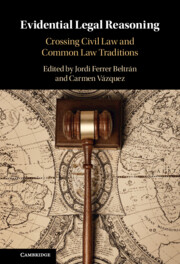Book contents
- Evidential Legal Reasoning
- Evidential Legal Reasoning
- Copyright page
- Contents
- Figures
- Tables
- Contributors
- Introduction
- Part I Evidence As an Area of Knowledge
- Part II Convergences between Systems
- Part III On Evidential Inferences
- Part IV Expert Evidence
- Part V Standards of Evidence As Decision-Making Rules
- 16 Burdens of Proof and Choice of Law
- 17 Is It Possible to Formulate a Precise and Objective Standard of Proof?
- 18 Prolegomena to a Theory of Standards of Proof
- Index
- References
17 - Is It Possible to Formulate a Precise and Objective Standard of Proof?
Some Questions Based on an Argumentative Approach to Evidence
from Part V - Standards of Evidence As Decision-Making Rules
Published online by Cambridge University Press: 05 May 2022
- Evidential Legal Reasoning
- Evidential Legal Reasoning
- Copyright page
- Contents
- Figures
- Tables
- Contributors
- Introduction
- Part I Evidence As an Area of Knowledge
- Part II Convergences between Systems
- Part III On Evidential Inferences
- Part IV Expert Evidence
- Part V Standards of Evidence As Decision-Making Rules
- 16 Burdens of Proof and Choice of Law
- 17 Is It Possible to Formulate a Precise and Objective Standard of Proof?
- 18 Prolegomena to a Theory of Standards of Proof
- Index
- References
Summary
In this study, I adopt an argumentative perspective on evidence, focusing on three points: (1) The structure of evidentiary inference; (2) which reasons count as good ones for establishing the degree of corroboration of a hypothesis and (3) the possibility of formulating a precise, objective standard of proof.
- Type
- Chapter
- Information
- Evidential Legal ReasoningCrossing Civil Law and Common Law Traditions, pp. 375 - 394Publisher: Cambridge University PressPrint publication year: 2022

